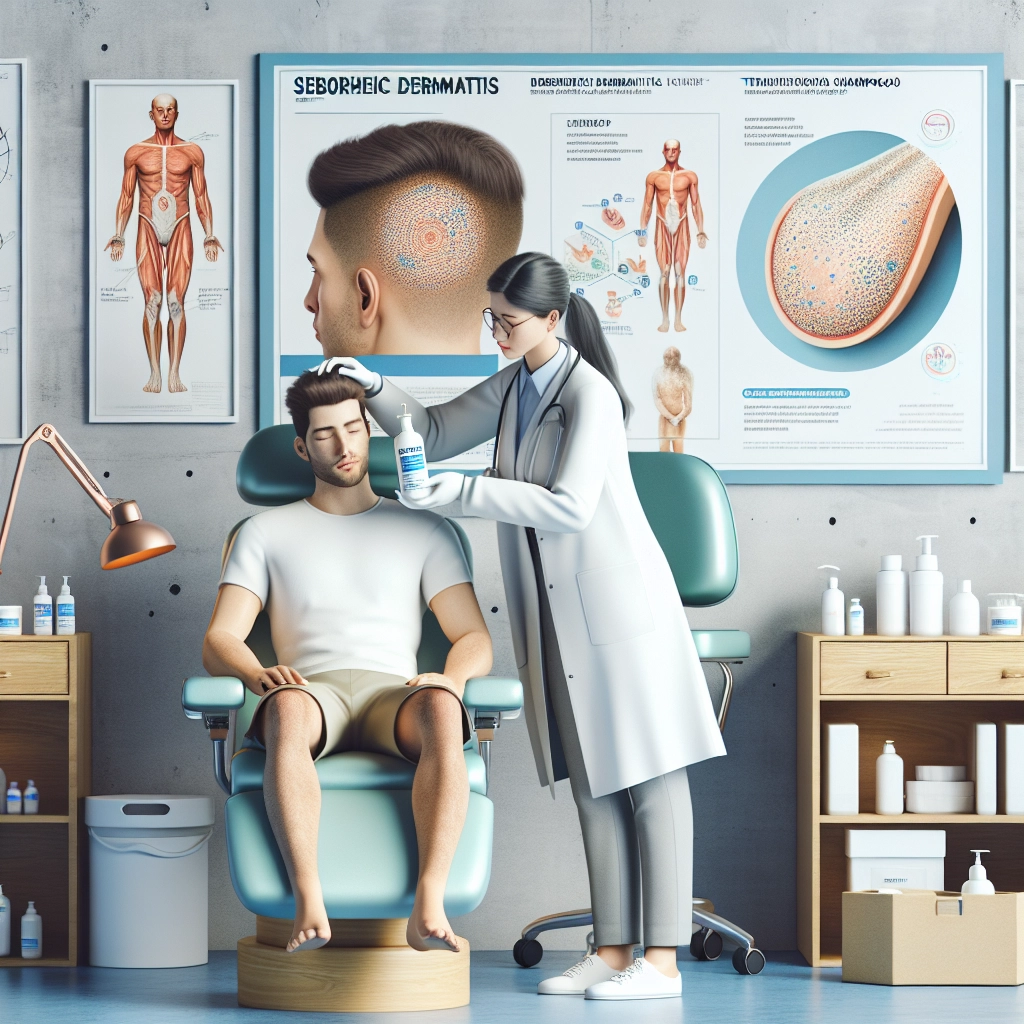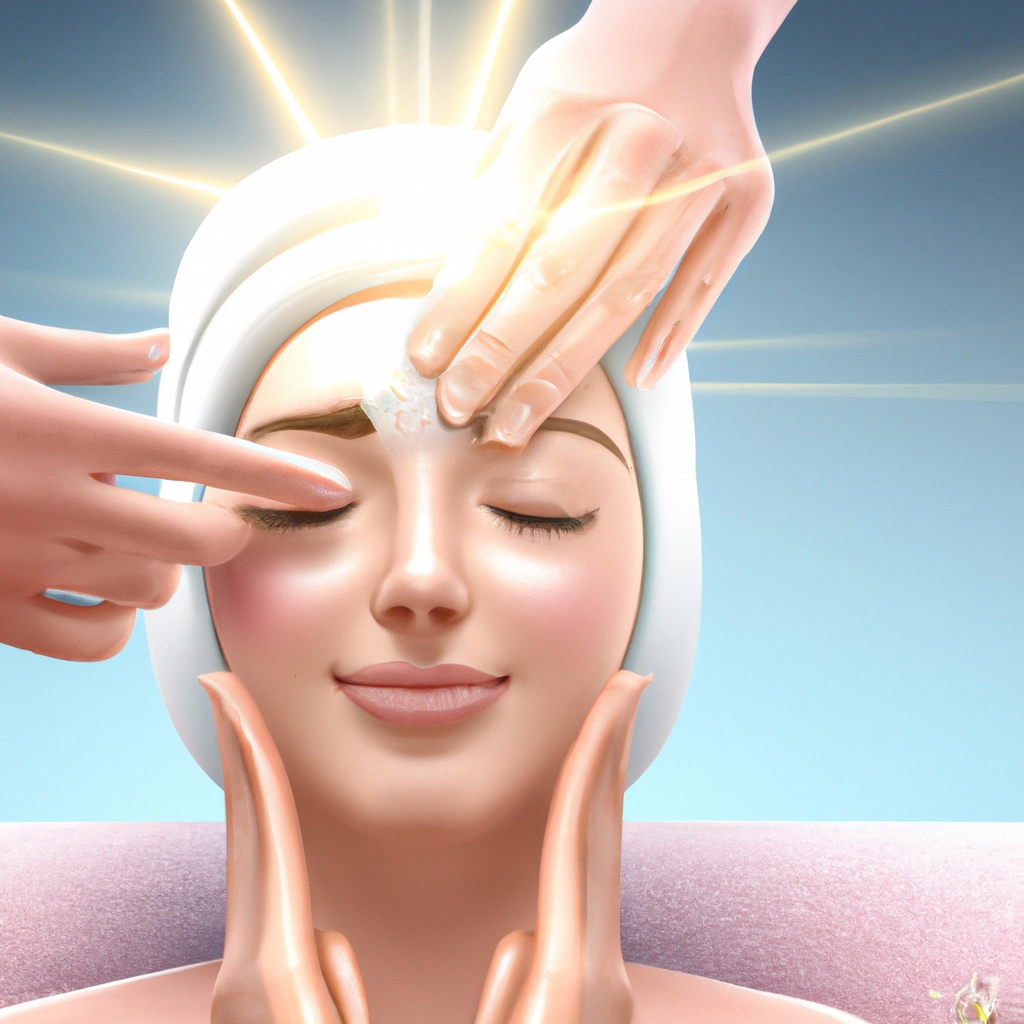

Seborrheic dermatitis is a common skin condition that causes dry, flaky skin, rashes on the scalp and face, and burning or itching sensations. These symptoms can be uncomfortable and affect the overall quality of life.
Seborrheic dermatitis can be caused by a combination of genetic and environmental factors, including excess oil on the skin, inflammatory reactions, and the presence of the yeast Malassezia. Understanding the causes of seborrheic dermatitis is essential for effective treatment and management.
Treatment for seborrheic dermatitis may include the use of mild corticosteroid creams, antifungal creams, dandruff shampoos, and other prescription products. It is important to consult with a healthcare provider for a proper diagnosis and personalized treatment plan.
Check out this Youtube video: “Seborrhoeic Dermatitis: Everything You Need To Know” for effective treatment methods and essential information on managing this skin condition.
Over-the-Counter Treatments
Medicated Shampoos
The best medicated shampoo for seborrheic dermatitis is one that contains ingredients like salicylic acid, ketoconazole, or ciclopirox, which effectively target the yeast that contributes to the condition. For example, Neutrogena T/Sal Therapeutic Shampoo is highly recommended for dealing with scalp issues like seborrheic dermatitis due to its active ingredient, salicylic acid.
Topical Creams and Lotions
When it comes to topical creams and lotions, emollients containing ingredients such as glycerol, propylene glycol, and urea are effective in relieving dryness, itching, and scaling associated with seborrheic dermatitis. These ingredients help the skin feel more comfortable for individuals dealing with skin conditions like eczema and psoriasis.
Antifungal Agents
Antifungal medicines like clotrimazole, miconazole, and ketoconazole are commonly used to treat seborrheic dermatitis by targeting the yeast overgrowth on the skin and scalp. These medications interfere with the production of fungal cell membranes, leading to the destabilization of the cell membrane and eventual eradication of the fungus.
Prescription Treatments
Steroid Creams and Ointments
Topical corticosteroids, such as clobetasone, hydrocortisone skin cream, and fluocinolone acetonide, are commonly prescribed for seborrheic dermatitis treatment. These creams and ointments effectively reduce redness, swelling, and itch associated with the condition.
They are widely used to address various skin conditions, including psoriasis, eczema, and vitiligo.
Prescription Shampoos
Prescription shampoos play a crucial role in treating seborrheic dermatitis on the scalp. Medicated shampoos like ketoconazole, ciclopirox, and selenium sulfide prove highly effective in managing the symptoms of seborrheic dermatitis.
They work by targeting fungal infections affecting the scalp, providing relief from dandruff, redness, and itching.
Antifungal Medications
In some cases, healthcare providers may prescribe antifungal medications to combat seborrheic dermatitis. These medications, including clotrimazole, miconazole, and terbinafine, are used to treat fungal infections of the skin, scalp, and nails.
They work by inhibiting the growth of fungi, thereby reducing inflammation and addressing the underlying cause of seborrheic dermatitis.
Home Remedies
Tea Tree Oil
Tea tree oil is an essential oil known for its antibacterial, antifungal, and antioxidant properties. It is commonly used to treat skin conditions such as acne, athlete’s foot, and nail fungus.
The antibacterial and anti-inflammatory actions of tea tree oil help reduce inflammation and promote healing, making it an effective natural remedy for seborrheic dermatitis treatment.
Coconut Oil
Coconut oil possesses antifungal properties, making it beneficial for treating skin conditions like seborrheic dermatitis. It can be used to combat itchy ailments such as athlete’s foot and provides moisture to the skin, offering relief from dryness and irritation.
Its multifaceted uses extend to promoting hair strength and health, as well as supporting oral health due to its plaque-dissolving properties.
Aloe Vera
Aloe vera gel is renowned for its soothing, moisturizing, and cooling properties, making it an excellent option for treating skin conditions like seborrheic dermatitis. It is specifically beneficial for sunburns, minor cuts or wounds, and can provide relief from itching and irritation.
Studies have shown aloe vera extract to be effective for various skin conditions, further establishing its value in natural remedies for seborrheic dermatitis treatment.
| Properties | Benefit |
|---|---|
| Tea Tree Oil | Antifungal & Antibacterial |
| Coconut Oil | Antifungal & Moisturizing |
| Aloe Vera | Soothing & Moisturizing |
Natural Treatments
Probiotics
Probiotics are live bacteria and yeasts that provide beneficial effects to the body. These friendly microbes help maintain a healthy balance of bacteria in the gut, boosting immunity against infections and combating less friendly types.
They play a crucial role in promoting gut health and overall well-being. Clinical studies have shown that probiotics can aid in reducing chronic systemic inflammation, emphasizing their significance in addressing seborrheic dermatitis.
Omega-3 Fatty Acids
Omega-3 fatty acids, commonly found in fatty fish, nuts, and seeds, have been recognized for their anti-inflammatory properties. Consuming foods rich in omega-3s can aid in alleviating chronic low-grade inflammation, which is closely linked to seborrheic dermatitis.
Evidence suggests that incorporating omega-3 fatty acids into the diet can potentially modulate inflammation and promote beneficial immune regulation via the gut microbiota, thus contributing to the management of seborrheic dermatitis.
Lifestyle Changes
Stress Management
Stress can have a significant impact on skin health, leading to increased inflammation, delayed wound healing, and exacerbation of skin conditions such as acne, psoriasis, and eczema. To manage stress and its effects on the skin, incorporating relaxation techniques like meditation and engaging in a healthy lifestyle is crucial.
Practicing mindfulness, staying hydrated, and ensuring adequate sleep are essential components of stress management for maintaining healthy skin.
Gentle Skin Care Routine
Implementing a gentle skin care routine is vital for individuals experiencing seborrheic dermatitis. It involves using a mild, non-abrasive cleanser, gentle exfoliation in moderation, and moisturizing with non-comedogenic products to prevent clogged pores.
Following the American Academy of Dermatology’s recommended skin care routine, which involves cleansing with a non-abrasive, alcohol-free cleanser, and reducing the use of harsh skincare products, can significantly benefit those with seborrheic dermatitis.
Here’s a comparison of potential stress management strategies and gentle skin care routines:
| Stress Management Strategies | Gentle Skin Care Routine |
|---|---|
| Mindfulness and meditation | Use of mild, non-abrasive cleanser |
| Staying hydrated | Gentle exfoliation in moderation |
| Adequate sleep | Moisturizing with non-comedogenic products |
Dermatologist’s Recommendations
Professional Treatment Options
For professional treatment options for seborrheic dermatitis, dermatologists may recommend externally applied or injected medicines to target the affected areas. UV light therapy is also a viable option to mitigate symptoms.
Additionally, a range of dermatologic surgical procedures such as mole removal and skin biopsies may be suggested by dermatologists. Cosmetic procedures like chemical peels, sclerotherapy, and laser treatments can be effective in addressing specific concerns related to seborrheic dermatitis.
Long-term Management Strategies
In terms of long-term management strategies, dermatologists emphasize the importance of self-management programs and support networks to aid in the continuous management of chronic conditions like seborrheic dermatitis. Additionally, dermatologists stress the need for attention to comorbidities in the acute phase and long term, which can assist in keeping the condition under control.
These strategies prioritize a holistic approach that considers the factors contributing to dermatological conditions, aiming for sustained relief and management.
| Professional Treatment Options | Long-term Management Strategies |
|---|---|
| Externally applied or injected medicines | Self-management programs and support networks |
| UV light therapy | Attention to comorbidities in the acute phase and long term |
| Dermatologic surgical procedures | |
| Cosmetic procedures |
Common Myths about Seborrheic Dermatitis Treatment
Debunking Common Misconceptions
Potential Side Effects and Risks
An important aspect to consider when exploring treatment options for seborrheic dermatitis is understanding the potential side effects and risks associated with each approach. Different treatments can lead to varying adverse reactions, ranging from minor discomfort to severe health complications.
It’s essential for individuals to be well-informed about these potential side effects to make an educated decision about their treatment plan.
Understanding the risks of different treatments involves assessing the potential adverse effects linked to specific medications and therapies. For seborrheic dermatitis, some treatment methods may lead to side effects such as skin irritation, dryness, or allergic reactions.
It’s crucial for individuals to be aware of these possibilities and consult with healthcare professionals to make informed choices that align with their health goals and preferences.
In addition to medication-related side effects, lifestyle interventions and complementary treatments also carry potential risks. These may include unexpected interactions with prescribed medications, allergic responses, or exacerbation of the dermatitis symptoms.
It’s important for individuals to cautiously evaluate the risks associated with these approaches and discuss them with healthcare providers.
It is worth noting that while treatments aim to alleviate seborrheic dermatitis symptoms, they may also pose certain risks that individuals should carefully consider. By proactively understanding the potential side effects and risks of various treatments, individuals can pave the way for a well-informed and personalized approach to managing seborrheic dermatitis.
Alternative Therapies
Acupuncture: Acupuncture, a key component of traditional Chinese medicine, has shown effectiveness in relieving pain from various conditions like back or neck pain, osteoarthritis-related knee pain, and even postoperative pain. Additionally, it has been used to treat overall wellness, anxiety, arthritis, depression, migraines, and even sleep-related difficulties. Acupuncture has gained recognition for its potential in treating a variety of diseases and conditions, making it a promising alternative therapy for seborrheic dermatitis.
Light Therapy: Light therapy, also known as phototherapy, has been found effective in treating conditions including depression, SAD, acne, and psoriasis. The exposure to specific light wavelengths triggers a chemical change in the brain, lifting mood and alleviating symptoms. Light therapy boxes mimic outdoor light and provide exposure to 10,000 lux of light. This therapy holds promise in managing skin concerns and plays a valuable role in treating seborrheic dermatitis, offering non-invasive and effective treatment options.
Recommended Amazon Products for Seborrheic Dermatitis Treatment
Here’s a curated list of products that can help you treat seborrheic dermatitis with ease. These recommendations are based on effectiveness, price, and customer reviews.
Dermarest Psoriasis Medicated Shampoo Plus Conditioner
This medicated shampoo is specifically formulated to relieve symptoms of seborrheic dermatitis, such as itching, irritation, and flaking. It contains 3% salicylic acid to help exfoliate and soothe the scalp.
– Pros and Cons
| Pros | Cons |
|---|---|
| Effectively Relieves Symptoms | May Dry Out Hair |
| Convenient 2-in-1 Formula | Strong Medicinal Scent |
MG217 Medicated Tar Ointment
This topical ointment is made with coal tar to help slow down the rapid growth of skin cells and provide relief from itching, scaling, and redness associated with seborrheic dermatitis. It’s fragrance-free and non-greasy, making it suitable for everyday use.
– Pros and Cons
| Pros | Cons |
|---|---|
| Non-greasy | Strong Smell |
| Immediate Relief | Can Stain Clothes |
Aveeno Skin Relief Intense Moisture Repair Cream
This non-medicated cream provides intense moisture to soothe and heal irritated skin affected by seborrheic dermatitis. It contains oat and emollients to help restore the skin’s natural barrier.
– Pros and Cons
| Pros | Cons |
|---|---|
| Fragrance-Free | Limited Efficacy |
| Gentle on Sensitive Skin | Not a Medicated Treatment |
Nizoral A-D Anti-Dandruff Shampoo
This over-the-counter shampoo contains ketoconazole, an antifungal agent that effectively targets the root cause of seborrheic dermatitis. It provides long-lasting relief from flaking, itching, and scaling of the scalp.
– Pros and Cons
| Pros | Cons |
|---|---|
| Clinically Proven Efficacy | Can Be Drying |
| Pleasant Fragrance | Not Suitable for Daily Use |
Neutrogena T/Gel Therapeutic Shampoo
This prescription-strength shampoo contains coal tar to effectively treat seborrheic dermatitis and help control the symptoms of psoriasis. It provides long-lasting relief from itching and flaking of the scalp.
– Pros and Cons
| Pros | Cons |
|---|---|
| Controls Scalp Itch and Flaking | Strong Smell |
| Recommended by Dermatologists | May Leave Residue |
Top Recommended Product for Seborrheic Dermatitis Treatment
If you’re looking for the best solution for seborrheic dermatitis treatment, we highly recommend Dermarest Psoriasis Medicated Shampoo Plus Conditioner. This 2-in-1 formula effectively relieves symptoms and provides convenience in one product.
Ready to improve your seborrheic dermatitis treatment? Check out Dermarest Psoriasis Medicated Shampoo Plus Conditioner today for the best results!


Conclusion
There are various treatment options available for seborrheic dermatitis, including medicated shampoos, topical corticosteroids, and antifungal creams. These treatments can help alleviate symptoms such as itching, redness, and flaking associated with the condition.
It is important for individuals with seborrheic dermatitis to work closely with a dermatologist to determine the most effective treatment plan for their specific needs. It may be necessary to try different treatments or combinations of treatments to find the most suitable option.
With proper and consistent treatment, seborrheic dermatitis can be well-managed, and symptoms can be minimized. It is important to follow the prescribed treatment regimen and maintain good skincare habits to effectively manage the condition.











